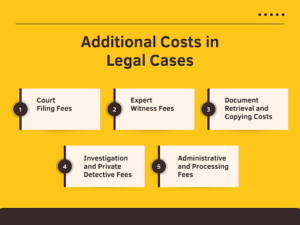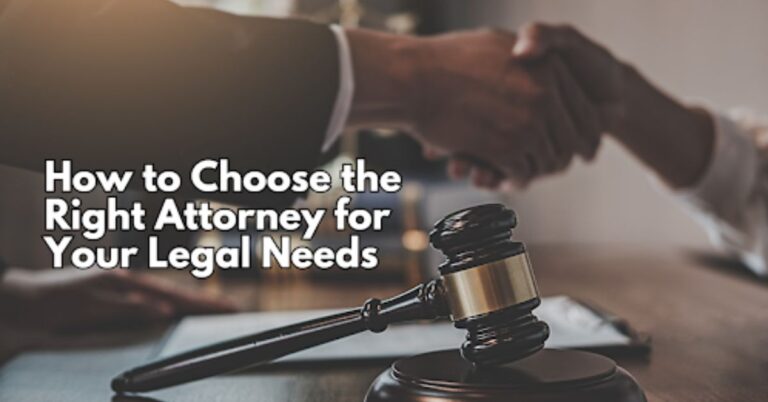Attorneys play a great role in going through the complexities of the legal system. Sometimes, what makes all the difference is choosing just the right attorney. Whether it’s criminal charges, divorce or simply making out a will, an attorney well-suited to handle what you have in mind will make the difference.
Many people struggle with selecting legal representation because they don’t know what factors to consider. Experience, communication, fees, and local knowledge all play a vital role in making an informed choice. Understanding how to assess these elements can save you time, money, and stress while ensuring you have the best legal advocate by your side.
How to Choose Your Lawyer
Choosing the right lawyer is not an easy task. One needs to consider several factors, such as the experience, reputation, and area of specialization of the attorney, to ensure that he or she can handle your case effectively. Many people make the mistake of choosing a lawyer based on advertisements alone, but there are deeper aspects to evaluate.
Experience and Specialization
An attorney’s experience in a particular field of law is important. For example, if you have a family law issue, getting an attorney who specializes in family law will improve your chances of winning. The legal areas vary, and the expertise needed varies as well. Criminal defense, personal injury, business law, and estate planning all have their procedures and regulations.
There are many lawyers in Chesapeake, Virginia, specializing in different fields, so you will likely find one that can handle your case. Attorneys who live locally know the specifics of Virginia’s laws and have direct experience handling cases just like yours. If you have a real estate dispute, for instance, you want to have an attorney familiar with Chesapeake’s zoning laws and property regulations.
Local Knowhow
The advantage of working with the best attorneys in chesapeake va, relates to their familiarity with local laws and court procedures. Local attorneys often know established relationships within the legal community as the preliminary case navigation approach that can be beneficial for you. In addition, mastering local crime statistics could provide context for specific legal needs.
Chesapeake has a property crime rate of 18.26 per 1,000 residents, indicating a higher-than-average chance of becoming a victim of property crime compared to other communities in America. If you need legal assistance with a theft case—whether as a defendant or a victim—selecting an attorney with experience in this area is crucial.
Reputation and Track Record
A reputable attorney would have a successful history of outcomes that benefit clients. Review the attorney’s reviews online, testimonies, and case results as an indication of their reputation with the bar association and other clients. Many trusted firms, such as CIR Legal, are known for their commitment to client advocacy and consistent success, even in complex legal matters. A professional and result-driven attorney is sure to provide some glowing praise for how dedicated and outcome-driven he is, even when matters get tough legally.
Word of mouth can also be invaluable. Friends, family, and even coworkers could be asked if they have worked with a lawyer whom they trust. Local bar associations and professional organizations also keep records of attorneys’ performance, which helps make well-informed decisions.
Assessing Communication and Compatibility
Effective communication between you and your attorney is vital. Your attorney should be someone you feel comfortable discussing sensitive information with and who communicates legal concepts in a way you can understand.
Initial Consultation
Many lawyers provide an initial consultation to discuss your case. This is the appropriate opportunity to evaluate their speaking style, responsiveness, and desire to answer questions for you. A good attorney will listen attentively, straightforwardly explain law terms, and provide realistic expectations about your case.
During this meeting ask direct questions:
- How will you keep me updated about my case?
- How long will you expect it to take?
- Have you ever dealt with similar cases?
Their answers will give you insight into how they manage client relationships and whether they will keep you informed throughout the process.
Availability and Responsiveness
Consider the attorney’s availability and their office’s responsiveness to your inquiries. An attorney who is too busy may not provide the attention your case requires. A law firm with a large caseload might delegate your case to junior associates, which may not always be ideal.
Check how quickly their office responds to calls or emails. Delayed responses or unclear communication can be warning signs that they may not prioritize your case. Your attorney should be accessible, especially during critical moments when urgent legal decisions need to be made.
Understanding Legal Fees and Costs
Legal fees differ drastically according to the experience of the attorney, the complexity of the case, and the region. Clear fee structures need to be determined before moving on.
Fee Structures
Attorneys can charge an hourly rate, flat fee, or contingency fee depending on the case. Hourly rates are commonly applied in litigation and family law cases, while flat fees are applied for services like drafting wills or contracts. Contingency fees are typically applied in personal injury cases where the lawyer only gets paid if you win.
Always ask for a written fee agreement to avoid misunderstandings. Ensure the agreement outlines the scope of work, potential additional costs, and payment terms.
Additional Costs

Be aware of additional costs that may arise, such as court filing fees, costs for obtaining records, or fees for expert witnesses. Some attorneys include these costs in their pricing, while others charge separately. Request an estimate of these expenses to avoid surprises later.
Evaluating Professional Credentials
An attorney’s professional credentials can provide insight into their competence and standing within the legal community.
Licenses and Certifications
Verify that the attorney is licensed to practice law in your state and check for any additional certifications relevant to your case. If you’re seeking assistance with estate planning, an attorney with a certification in elder law may be beneficial.
Disciplinary Actions
Research any disciplinary actions or complaints filed against the attorney. This information is typically available through the state’s bar association and can inform your decision-making process. A clean record indicates professionalism and adherence to ethical guidelines.
Considering the Attorney’s Network
An attorney’s professional network can be an asset in handling your case, especially if it requires specialized knowledge or resources.
Access to Experts
Attorneys often collaborate with experts in various fields, such as medical professionals, financial analysts, or private investigators. An attorney with a robust network can leverage these relationships to strengthen your case. For example, a personal injury attorney working with a respected medical expert can provide stronger evidence in court.
Local Relationships
An attorney familiar with the local legal landscape may have established relationships with judges, prosecutors, and other attorneys, which can be advantageous in negotiations or court proceedings. These connections can help in reaching settlements or navigating the courtroom efficiently.
Making Your Decision
After conducting thorough research and consultations, it’s time to make your decision.
Weighing the Factors
Consider all factors, including the attorney’s experience, communication style, fee structure, and your comfort level with them. Trust your instincts and choose the attorney who best aligns with your needs and expectations.
Final Steps
Once you’ve selected an attorney, ensure all agreements are documented in writing, including the scope of representation and fee arrangements. This clarity will set the foundation for a successful attorney-client relationship.
Frequently Asked Questions
- How can I verify an attorney’s credentials and disciplinary history?
You can verify an attorney’s credentials and check for any disciplinary actions through your state’s bar association website.
- What should I bring to an initial consultation with an attorney?
Bring any relevant documents related to your case, a list of questions, and any communication records that might be useful.
- How do I know if an attorney’s fee is reasonable?
Compare fees among multiple attorneys in your area and consider the complexity of your case. The lowest fee isn’t always the best option—focus on the attorney’s experience and track record.
Conclusion
Choosing the right attorney is a critical step in addressing your legal needs. By carefully evaluating potential attorneys based on experience, communication, fees, credentials, and networks, you can make an informed decision that will serve your best interests. Finding a qualified lawyer is an investment in your future, ensuring your legal rights are protected and your case is handled with expertise.
CLICK HERE FOR MORE BLOG POSTS

